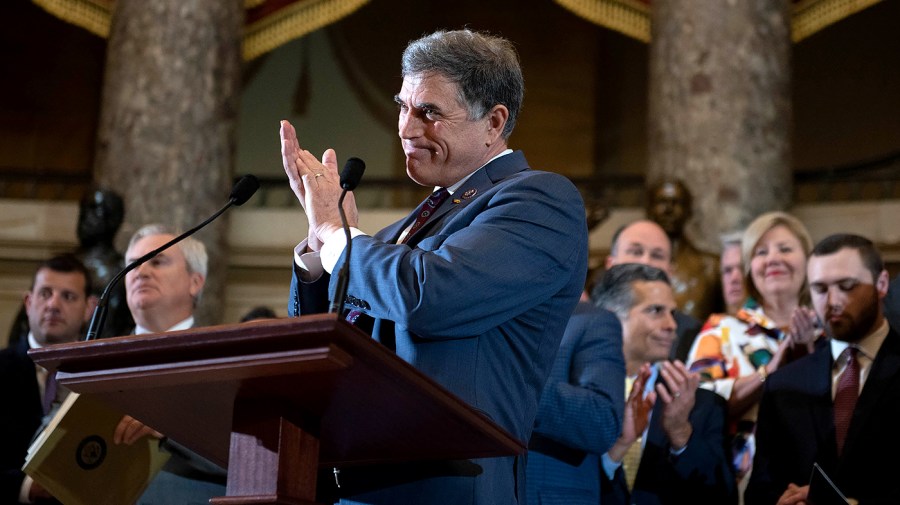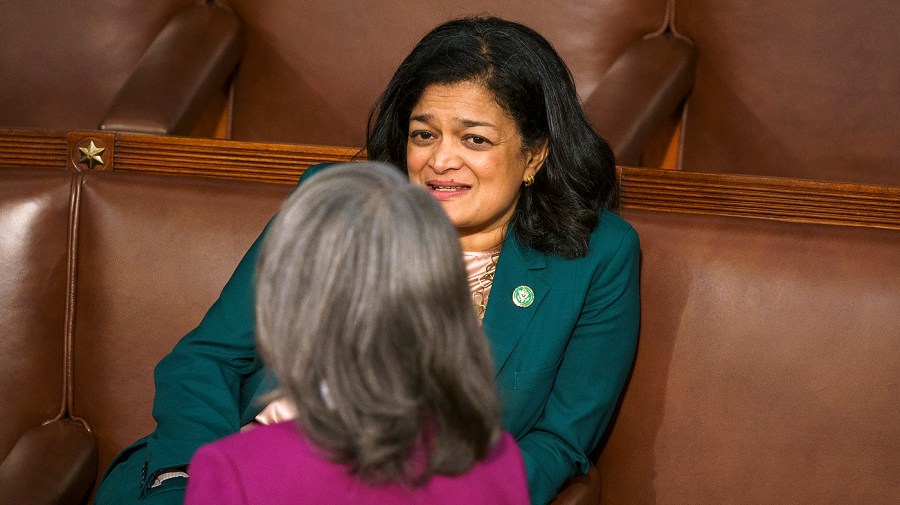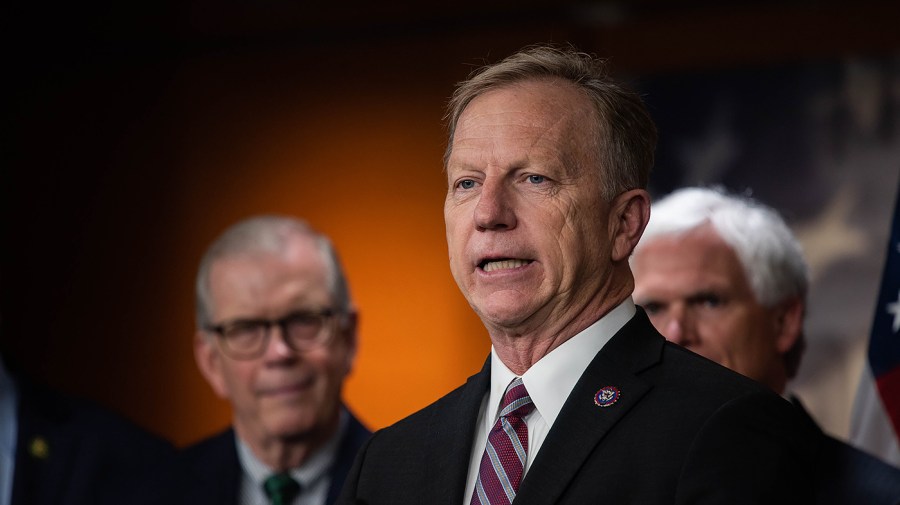McCarthy shifts, voices new confidence in debt ceiling deal
Bipartisan negotiators racing to secure a debt ceiling deal voiced new confidence Thursday that they’ll locate a compromise before a federal default.
But even as President Biden and Speaker Kevin McCarthy (R-Calif.) both hinted at significant progress in the talks, rank-and-file lawmakers in both parties are raising alarms about the concessions their leaders have made — pushback that’s highlighted the hurdles certain to face leadership as they prepare to sell an emerging agreement to their respective conferences.
“We’re not there. We haven’t agreed to anything yet. But I see the path that we could come through,” McCarthy told reporters Thursday morning, adding, “it’d be important to try to have the agreement, especially in principle, by sometime this weekend.”
It’s an ambitious timeline for negotiations that began in earnest only nine days ago. And in order to be successful, party leaders will have to navigate the various pressures from rank-and-file lawmakers in both parties.
For McCarthy, that means assuring leery conservatives that he’s not straying too far from the legislative package passed through the House late last month, which combined a debt limit increase with steep cuts in federal spending.
“You can’t continue to spend and spend and spend without constraints. That’s completely irresponsible. And we’re just not going to do that,” Rep. Andrew Clyde (R-Ga.) said.

Rep. Andrew Clyde (R-Ga.) speaks during an enrollment ceremony for the Revised Criminal Code Act in the Capitol on Friday, March 10, 2023. (Annabelle Gordon)
If Biden won’t accept the level of cuts passed by the House, he added, McCarthy should demand tougher border security measures as part of the package.
The Freedom Caucus complicated McCarthy’s task further Thursday, urging the Speaker to step away from the negotiating table and demand that Democrats accept the House-passed bill.
“There should be no further discussion until the Senate passes the legislation,” the group said in a statement.
Meanwhile, Biden is facing his own headaches from the left.
More on the debt ceiling from The Hill:
- Conservatives make last-minute push for border security in debt ceiling package
- Freedom Caucus says ‘no further discussion’ on debt ceiling until Senate passes House GOP bill
- With Biden in Japan, Harris pushes White House message on debt ceiling
- Senate to break for recess as debt ceiling talks heat up
- Democrats warn Biden against cutting debt ceiling deal with McCarthy
For the past few days, liberals in both chambers have come out in strong opposition to GOP-backed proposals for tougher work requirements for federal assistance programs — a position amplified this week by House Minority Leader Hakeem Jeffries (D-N.Y.), who has sided squarely with his progressive members.
“We have continued to make clear, as House Democrats, that so-called extreme work requirements that these MAGA Republicans want to try to impose as a ransom note are a nonstarter,” Jeffries told reporters in the Capitol. “Period. Full stop.”
While Biden has seemingly ruled out changes to Medicaid in negotiations with McCarthy, he sparked confusion and — in some cases — frustration in his party when he appeared to open the door for stricter work requirements for other programs, such as the Supplemental Nutrition Assistance Program (SNAP) and Temporary Assistance for Needy Families.
Republicans have sought to toughen the work requirements for all three of those programs, provisions featured in their debt limit legislation.
“What I’ve said in the past is, I understand he voted for work requirements in 1996 and some other things in ‘86 with the crime bill, but we didn’t elect the Joe Biden of 1986 and 1996, we elected the Joe Biden of 2020,” Rep. Pramila Jayapal (D-Wash.), chairwoman of the Congressional Progressive Caucus, told reporters Thursday.
“They hurt the very people that they’re designed to serve. And to put them on something like SNAP at a time when hunger is now reaching pandemic levels in the country is something that is not a core Democratic value,” Jayapal said, describing the push as a “nonstarter.”
The comments echo the sentiment of Democrats in both chambers worried about the concessions the White House could wind up making as part of the bipartisan talks, underlining the potential uproar in store for the president if his party is unsatisfied with the final deal.
“The president tends to float a lot of things, sometimes spontaneously,” said Rep. Jesus “Chuy” Garcia (D-Ill.). “But I can tell you the work requirements piece is a nonstarter with a vast majority of the Progressive Caucus, and that’s the largest caucus” among House Democrats.
“So, it’s quite problematic.”

Rep. Pramila Jayapal (D-Wash.) returns to the House Chamber on the second day of the 118th session of Congress on Wednesday, January 4, 2023. (Greg Nash)
While McCarthy has continued to insist on the work requirement changes, he and others in the party have refrained from publicly drawing further red lines, as tensions on both sides escalate ahead of the looming default deadline, which the Treasury Department has warned could arrive as soon as June 1.
But that doesn’t mean some Republicans aren’t sending warning signals.
“I’m gonna still vote against it because I’m against raising the debt ceiling,” said Rep. Tim Burchett (R-Tenn.), one of the four Republicans to oppose the Republicans’ bill last month. “And I guarantee you you’ll pick up more people [in opposition], because other people have gotten hammered on their vote.”
Another sticking point between the parties is the question of how long the government’s borrowing authority should be extended.
The Republicans’ bill would hike the debt ceiling through next March, at the latest, meaning Congress would have to revisit the issue again before the 2024 elections. Biden and Democrats have rejected that timeline, demanding a longer window to get beyond those elections.
“I don’t see any way that we kick the can down the road for anything less than two years,” Rep. Pete Aguilar (Calif.), chairman of the House Democratic Caucus, said this week.
Spending levels are another major point of contention.
The Republican bill would reduce deficit spending by roughly $4.8 trillion over the next decade, capping spending at fiscal 2022 levels next year and limiting growth to 1 percent in each following year. And conservatives are warning that anything less must be met in kind from Democrats.
“We’ve got $1.5 trillion for a year versus 4.8 trillion in cuts,” Rep. Kevin Hern (R-Okla.), head of the Republican Study Committee, told reporters Thursday. “So, it’s gonna get real difficult as [there’s] less and less spending cuts. I can’t imagine that the body would be in unity for $1 for dollar.”

Rep. Kevin Hern (R-Okla.) speaks during a press conference to discuss The Lower Energy Costs Act on Tuesday, March 28, 2023. (Annabelle Gordon)
The challenge facing McCarthy and his leadership team is to find a compromise that can win the support of Biden and congressional Democrats without alienating conservatives in his own conference, who have distrusted his conservative bonafides in the past.
Earlier this week, McCarthy tapped Rep. Garret Graves (R-La.), a close ally, to spearhead the talks with Biden administration officials, and some Republicans see him as the key to finding that balance.
“That’s why the Speaker has put him forward,” Hern told The Hill. “As these sort of suggestions, demands, requirements … it’s their job to go out and sort of float a balloon to see how those are going to work.”
On the other side, the White House has tapped known dealmakers Shalanda Young, head of the Office of Management and Budget, and Steve Ricchetti, a top Biden adviser, as well as legislative affairs chief Louisa Terrell to work toward a compromise.
Discussing a potential timeline to clinch a deal Thursday, McCarthy voiced optimism that negotiators “have a structure now” and have people “working two or three times a day, then going back, getting more numbers.”
McCarthy also lauded Biden’s picks to lead the talks — a move by the White House seen as a significant step, given the officials’ extensive experience working with congressional members on both sides.
“I have the greatest respect for Shalanda and Ricchetti. I mean, they are exceptionally smart,” McCarthy said. “They are strong in their beliefs on the Democratic side, just as who we have in the room.”
Mychael Schnell contributed.
Copyright 2023 Nexstar Media Inc. All rights reserved. This material may not be published, broadcast, rewritten, or redistributed.

